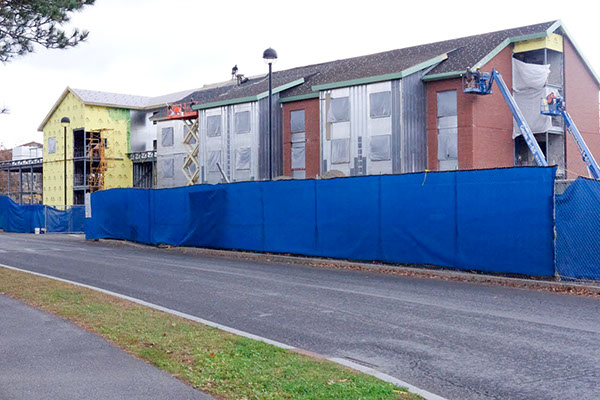
SUNY New Paltz Department of Residence Life (ResLife) has announced that come next academic year, incoming first-year students will be limited to living in corridor-style residence halls. This is the first time a restriction has been placed on where first-year students may live on campus.
The decision is in line with ResLife’s current practice of putting as many first-years in corridor-style buildings as possible, Coordinator for Housing Operation Rafael Calderon said. However, until now the percentage of the total corridor-style rooms needed to sufficiently accommodate the number of incoming first-year students — about 1,125 — could not be met without affecting where returning students could register to live. With the construction of the new Ridgeview Residence Hall located parallel to the Health Center, opening in Fall 2015, the college now has the means to house all first-years in corridor-style rooms, Calderon said.
Ridgeview will be a corridor-style building containing 236 beds, bringing the total number beds in corridor-style residence halls at SUNY New Paltz to 2,122 — 53 percent of which will be utilized to accommodate incoming first-years according to the data.
Currently, only a few first-year students live in suite-style rooms, Director of Residence Life Corinna Caracci said. Caracci said one of the reasons ResLife’s policy has been to house first-years in corridor-style halls is due to the “open-door community” environment that is less present in suites where social activity can be limited only to one’s suitemates.
“We know better from our research and experience that students who live in a corridor-style room in their first year helps them acclimate to college life socially and succeed academically,” Caracci said.
Caracci also cited an example of where age discrepancy between suitemates could create social difficulties.
“If a first-year is living in the same suite as an upper-classman who is 21-years-old and that student wants to drink in the suite, it may pose a situation where the upper-classman must choose to exclude the first-year student from the social engagement or possibly allow that student to drink underage,” Caracci said.
However, some students believe that the decision to restrict first-years’ living options may have unperceived negative consequences.
“Unlike some other SUNYs, the ability for first-year students at New Paltz to live in suite-style residence halls is — was — an attractive feature for applicants to the college,” a student services worker speaking on the condition of anonymity said.
Other students have brought up possible problems the restriction presents for non-cis gender identifying students.
“I think this decision may potentially put incoming transgender and gender non-conforming students in an uncomfortable position where they are placed in a gender-segregated corridor-style hall that does not match their gender identity,” Student Association Sen. Dana Hershkowitz said. “There may also be a situation in which an incoming first-year may be questioning their gender identity and would prefer the option of gender-neutral housing available in some suites so not to be stigmatized.”
Hershkowitz said herself and fellow senator, Adriana Dulmage, will be meeting with Caracci on Nov. 19 to discuss the issue.
